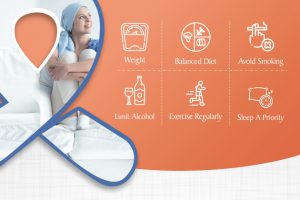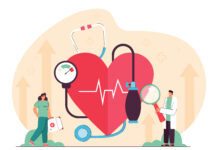

Cancer Prevention Tips
Are you concerned about reducing cancer risk? Make your lifestyle choices healthy and prevent yourself from cancer risk! A small and simple change in your lifestyle can make a difference. For example, stop using tobacco, reduce alcohol consumption, eat a healthy diet, maintain a healthy weight, and be more active. Research shows that the development of many cancers is linked to lifestyle behaviors. Poor diet and being inactive are the main factors to increase cancer risk. Hence, it is important to have a balanced diet rich in vegetables, fruits, and whole grains with a healthy lifestyle. Following tips may help us to prevent the cancer risk.
Tips to Reduce Cancer Risk
- Get regular screening tests done to find cancer at an early stage
- Get vaccinated against human papillomavirus and hepatitis B virus
- Maintain a healthy weight
- Eat a healthy balanced diet ( Know about healthy diet)
- Limit the intake of foods with added sugars
- Limit the intake of saturated fat and processed meat
- Avoid smoking
- Limit the intake of alcohol
- Protect skin from ultraviolet radiations of the sun
- Avoid exposure to toxic substances such as asbestos fibers and benzene
- Exercise regularly
- Make quality sleep a priority
- Get enough vitamin D
List of Foods to be Added to Our Diet to Reduce Cancer Risk
- Broccoli
- Carrots
- Beans
- Berries
- Cinnamon
- Nuts
- Citrus fruits
- Tomatoes
- Flax seeds
- Garlic
- Fatty fish
Get Regular Cancer Screening Tests to Reduce Risk of Cancer
- People over the age of 45 should get a colonoscopy to screen for colorectal cancer
- Women who are above 45 years should get mammograms every year to screen for breast cancer
- Men over the age of 50 should consult their doctor if they need a prostate cancer test
- A smoker or ex-smoker should talk to a doctor about a CT scan for lung cancer
- Consult a dermatologist every year to check skin from head to toe for unusual spots that could lead to skin cancer
A person with a risk of cancer should get a CA-125 test (cancer screening test) done. This test measures the amount of cancer antigen 125 protein present in the blood. The presence of CA-125 protein in blood shows the presence of cancer cells in the body. The CA-125 test is done to diagnose cancer and monitor cancer during and after the treatment.










